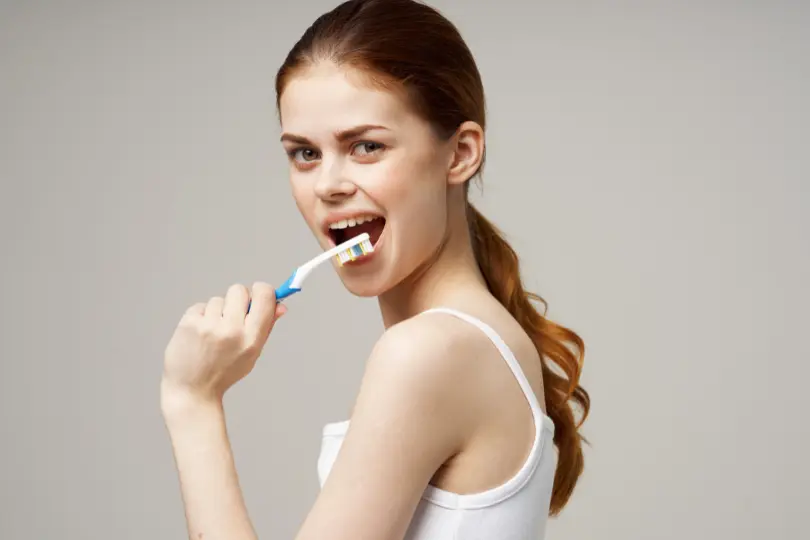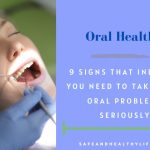
Maintaining good oral hygiene habits protects your teeth and improves your self-esteem and general quality of life.
These are the seven best strategies for optimal oral hygiene.
1. Brush Properly Twice a Day
It’s crucial to brush your teeth at least twice a day. Make sure to clean your teeth on all their surfaces for at least two minutes. Take care to clean each tooth’s chewing, front, and back surfaces.
Plaque is also removed by regular brushing. To remove bacteria and freshen your breath, make sure you scrape your tongue gently before brushing. Replace your toothbrush regularly or sooner if the bristles begin to break down.
2. Floss Daily
Plaque and food particles that your toothbrush cannot reach in the spaces between your teeth and beneath the gum line are removed when you floss at least once a day. With around 18 inches of floss for teeth, encircle your middle fingers with most of it, leaving an inch or two on either side for handling. Forming a C-like pattern against each tooth, slip it softly between them and move it up and down.
Maintaining good oral health and avoiding gum disease requires consistent flossing. Use a fresh piece of floss on each tooth to prevent the spread of germs. They may help remove dirt from teeth. Flossing promotes better breath in addition to preventing gum disease and cavities.
3. Use Mouthwash
Mouthwash removes debris from hard-to-brush regions around the gum line, helps restore tooth mineral density, and lowers the amount of acid in your mouth. To help prevent gum disease and minimize plaque, use an antibacterial mouthwash. After brushing and flossing, using mouthwash guarantees a deeper clean.
If you want a gentler mouthwash or have sensitive gums, go for alcohol-free mouthwash. Fluoride-containing mouthwash helps fortify enamel and stave against tooth decay.
Including mouthwash in your routine can improve your entire oral hygiene regimen by leaving your mouth feeling clean and fresh throughout the day. Keep in mind to use mouthwash according to the directions on the package and to never swallow it.
4. Limit Sugary and Acidic Foods
Eat and drink less acidic and sugary meals and drinks, as these can erode tooth enamel and lead to cavities. Acidic beverages, such as citrus juices and soda, can erode your enamel. To make your teeth stronger, choose meals high in calcium and phosphorus, dairy products, and water.
Instead of eating sugary and acidic foods and beverages as snacks throughout the day, think about having them at meals to protect your teeth. This lessens the likelihood of being exposed to dangerous compounds regularly and allows saliva to counteract oral acidity. After consuming anything sweet or acidic, rinse your mouth with water.
5. Stay Hydrated
Water increases salivation, which is necessary to counteract oral acids and shield teeth from decay. Maintaining hydration promotes general oral health and keeps your mouth clean.
Apart from water, the substances present in green and black teas can inhibit the growth of germs and lower the likelihood of cavities. Nevertheless, since these might negate the advantages of teas, it is important to refrain from adding sugar or acidic components to them.
A better pH balance in your tongue may also be maintained by limiting the number of times you eat and the amount of sugary or acidic drinks you consume during the day. This easy habit may significantly contribute to better oral hygiene and reduce the likelihood of developing dental issues over time.
6. Replace Your Toothbrush Regularly
You must always replace your toothbrush once every three months days, or earlier if the bristles are tangled. Plaque and tooth cleaning are less successful with an old toothbrush.
Furthermore, with time, germs may build up on the bristles. Better dental hygiene is promoted and maximum cleaning power is ensured when using a new toothbrush.
After getting better from an illness, think about getting a new toothbrush to avoid becoming sick again. Choosing toothbrushes with soft bristles can also assist in cleaning your teeth more thoroughly while avoiding harm to your gums and tooth enamel. These easy steps contribute to overall dental health and ensure your oral hygiene routine remains effective.
7. Visit Your Dentist Regularly
Throughout the year, maintaining optimal oral health requires routine dental checkups. It is advised to make an appointment for complete examinations and expert cleanings at least twice a year with your dentist.
Regular examinations enable your dentist to identify any possible problems early on, including gum disease, cavities, and indications of oral cancer. Your dentist can stop these problems from getting worse and necessitating more involved procedures by taking care of them right away.
Regular visits also allow your dentist to provide you with individualized guidance on how to maintain your oral hygiene at home, including how to brush and floss according to your unique dental needs. Overall, selecting the best dentist in Raleigh, NC, or the best dentist in your local area, guarantees that you will get professional advice and treatment to maintain your teeth and gums.
Conclusion
Make oral health a priority to reap long-term advantages for your general health. You may avoid dental issues, support the health of your gums and teeth, and have a whiter smile by implementing these seven suggestions above.
About The Author:
Stacey Smith is a freelance health writer. She is passionate about writing about women’s health, dental health, diabetes, endocrinology, and nutrition and provides in-depth features on the latest in health news for medical clinics and health magazines.




